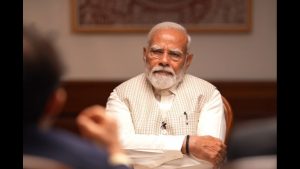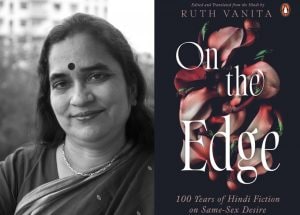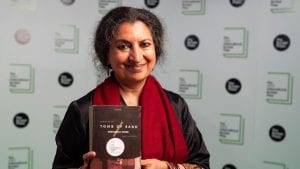Exclusive | Full text of the PM interview: Modi’s agenda for the next 5 years
Summary
Network18 Group Editor-in-Chief Rahul Joshi, along with News18 Lokmat’s Vilas Bade and News18 Kannada Editor Hariprasad speak with Prime Minister Narendra Modi in an exclusive interaction ahead of the remaining phases of the ongoing Lok Sabha elections 2024. Here’s the full text of the PM Modi interview:
Network18 Group Editor-in-Chief Rahul Joshi, along with News18 Lokmat’s Vilas Bade and News18 Kannada Editor Hariprasad speak with Prime Minister Narendra Modi in an exclusive interaction ahead of the remaining phases of the ongoing Lok Sabha elections 2024.
Here’s the full text of the PM Modi interview:
Rahul Joshi: Modi ji, we have been touring the whole country. We were in the south, went to Bihar, and Maharashtra too. Whether we talk to the Opposition or your candidates, they say that ‘when Modi ji comes here, everything will change’. They say ‘nothing can be said right now’. ‘If Modi ji comes here, it is possible that there will be a sweep, it is possible to bag the seat’. Can this 2024 election be seen as a referendum on Narendra Modi?
PM Modi: Now that’s the business of the media—how and when to analyse. But I would say this much that I don’t run any election-time government. If you see my record of 10 years, then on an average, Fridays, Saturdays and Sundays, I went to some corner of India. I have been among the people and that is why my visits continue. I believe elections are the festival of democracy and as such it is the duty of all political parties to go among the people as much as possible. They should engage in dialogue and discussion. So, whether it’s election time or not, I consider it my duty as a worker in the political field to meet the people.
As far as these two phases of elections are concerned, I have seen such public support in very few elections. In a way, the people are fighting these elections. They are fighting for good governance. They are fighting to fulfill their dreams. I feel perhaps I am just the medium. I am more enthusiastic to go among the people this time because when the people are so enthusiastic to take up such a big responsibility, I feel it is my duty to bow down to them and seek their blessings. When the first round of elections took place, I had told some friends that people who were campaigning against us were finished. After the second round, they are demolished. First, people finished them, now they demolished them.
Rahul Joshi: Modi ji, you started the campaign on a very high note. You introduced the entire work of the government. You moved forward with the development agenda. You shed a lot of light on the economy and a lot of work has been done on it. Now, after a couple of rounds, you made a direct attack on the Congress manifesto at a rally in Rajasthan. You even said that they have a scheme through which they want to distribute wealth. They want to find out who has how much savings, who has how much money, who has how much gold, silver and they want to distribute it among Muslims and infiltrators. Is this threat so real? Do you see it like that?
PM Modi: I feel that maybe your team has not tracked my entire campaign. There are many good developmental things which may not be fitting in terms of TRP. But you must have seen that my entire election campaign is focused on two things. One, we have done work for the welfare of society. The biggest difference in this government [compared to previous ones] is that last-mile delivery is our specialty. See, no government is formed to do bad, it wants to do good. Some people know how to do good for others, some people wait for good things to happen. I am a person who believes in working hard and getting things done.
Now see, I am continuously saying in the elections that we have built four crore houses for the poor. I tell so many people that when you go for this election campaign, please help me by sending a list of people whose houses have not been built. As soon as my third term starts, I want to take this work forward. I want to build three crore more houses. The Ayushman Bharat Yojana is the world’s largest health insurance and health assurance scheme. This is the assurance of treatment to 55 crore people. It is an assurance that Modi’s government is with you. This time, we have said in the manifesto that no matter which class, society, background a person belongs to, whoever is above 70 years of age—both men and women—will get free treatment up to ₹5 lakh. This time we have also said in the manifesto that we will give this benefit to ASHA workers. We will give benefits to transgenders, no matter what their age is.
Now you have seen, in our country, banks have been nationalised, and they are playing these games of confiscation. This has already been done in the past. All the banks were private, they have looted and are taking money in the name of the poor. The condition of banks in our country was miserable. More than half of the population of the country was such that it gave money to open accounts in banks but the banks never opened their accounts. Then Modi came and opened 52 crore bank accounts, and I took the biggest advantage of it. I took the trinity of Jan Dhan, mobile and Aadhaar and encouraged Direct Benefit Transfer. A sum of ₹36 lakh crore—the figure is very big—has gone into people’s accounts [via Direct Benefit Transfer]. This huge financial inclusion has happened in our country [due to opening of accounts]. This is more than the number of accounts that would have opened in the world in a year. There is Jal Jeevan Mission in our country. In India, 3-4% of the villages would get water from taps in their homes, that too in urban localities. Today, tap water has reached 14 crore rural families.
Now all this work is what helped 25 crore people come out of poverty. We have empowered them, and my strategy is that we give so much strength to the poor, so much power, that the poor themselves overcome poverty. And when the poor overcome poverty with their hard work, after that they do not want to go back to poverty. It becomes a commitment, and they become the strength of the country. Today, we are benefiting as 25 crore people have come out of poverty. It is a very big achievement, the world is praising it, and this will become a model for the developing countries.
You see, what was the situation before 2014? Fragile 5 used to be the headline. Today, we have become a vibrant economy. In IMF, there is a group of 150 countries of the world—which includes China and India—which we can call developing countries or countries with an emerging economy. They analysed such a group by classifying them together. It is a very interesting observation.
Now see what the analysis is. In 1998, India’s per capita GDP was around 30%, compared to others in the peer group. At that time, Atal ji’s government was in power. From 1998 to 2004, Atal ji took this figure from 30% to 35%. It was a good progress. But unfortunately, in 2004, this khichdi company came, and this khichdi company ruined the work of Atal ji. They brought the number down from 35% to 30%. All these countries [in the peer group] performed better than India. During the UPA regime, India became poorer compared to the other countries in the developing world. Those poorer than us went ahead.
But in 2014, after the formation of the government, till 2019, you will be happy to know that we took the figure to 37%. And when I reached the year 2024, this figure was 42%. That means our income has grown very fast as compared to other countries of the world. If you look at the inflation rate in the period of ten years, which is discussed so much, then these ten years have seen the lowest inflation. What I am saying is on the basis of reality. We have achieved this after a lot of hard work. We have mobilised the entire government, and we have put in our best efforts to achieve the target. Despite that, what does Modi say? Modi says this is just a trailer, I have to go further. I want to move very fast, taking the country along with me.
So far as the Congress manifesto is concerned, someone please tell me, are the manifestos of political parties during elections a mere showpiece? It is the work of the media to read the manifestos of every political party. I was waiting for the media to comment on it. I had commented on the manifesto on the first day. After seeing the manifesto, I feel that it has the stamp of the Muslim League. I thought that the media will be shocked. Those who do analysis will be shocked. But they just kept saying whatever is presented by the Congress. Then I thought that this seems to be a big scam of the ecosystem and I will have to bring the truth. I waited for 10 days that the evils in the manifesto would be brought out by someone or the other because if it is brought out in an unbiased manner, it is good. Finally, I was forced to bring out these truths.
You see, when one of their mahashay gave an interview in America where he brought up the issue of inheritance tax, about 55% tax on your property. Now I am talking about development and inheritance and they are talking of plundering that inheritance. Their history till date is about doing what they have mentioned in the manifesto. It is my responsibility to tell the countrymen that they are taking the country in this direction. Now you decide whether you want to go or not. But it is my responsibility that on the basis of facts and importance, I should tell you [the truth].
Rahul Joshi: Sam Pitroda ji spoke about inheritance tax on the wealth we save for our family when we give it to our next generation. This tax could be very high. Will you say that if BJP comes to power, it will never implement this tax?
PM Modi: What the Bharatiya Janata Party (BJP) plans to do is written in our manifesto. How does the thought that we will carry forward their plan even come to your mind? The ideology of the Bharatiya Janata Party is clear. We go before the country with our manifesto and work. Please don’t impose their great thoughts on us.
Rahul Joshi: Rahul Gandhi has spoken about a national X-ray or socio-economic survey, along with caste census. The institutional survey will look at which sections are behind and will redistribute the wealth accordingly.
PM Modi: People who consider themselves political experts should ask such people that if the conditions you (Congress) describe are real, then you have been in power for 50–60 years. You gave birth to this. Why did you let it come to this? Secondly, X-ray means raiding every household. If any woman has hidden gold where she stores grains, even that will be X-rayed. The jewels will be confiscated. Land records will be scrutinised. And these will be redistributed. This Maoist ideology has never helped the world. This is an entirely ‘Urban Naxal’ thought. This is why the Jamaat, which usually keeps writing, kept quiet about the manifesto even after 10 days, because it will help them. They kept quiet to protect them. It then becomes my responsibility to awaken the country to the fact that they are planning to loot you. The next part is Dr Manmohan Singh has said clearly who has the first right on the country’s resources. They have clearly stated their intentions.
Rahul Joshi: A video of 2006 is going viral in which Manmohan Singh ji has said that poor Muslims have the first right on resources. He has clearly said this. You have also pointed out this in the Manifesto that he would like to take a part of the OBC reservation and give it to Muslims and between 2004-2014, he has tried to do this four-five times.
PM Modi: You have asked a very interesting question. The answer will be long but, for the sake of the country, I will have to tell you.
You see the history of Congress; this demand (for reservation) has been raised since the 1990s. There is a huge section of society in the country which felt that something should be done for them, there were protests for it. Before 1990, Congress completely opposed it and suppressed it. Then whatever commissions they formed, whatever committees they formed, their reports also started coming in favour of OBCs. They kept denying, rejecting, and suppressing these views. But after the 90s, due to vote-bank politics, they felt something must be done.
So, what was the first sin they committed? In the 90s, they decided to classify Muslims as OBCs in Karnataka. So they were rejecting and suppressing OBCs earlier, but for political gains, they labelled Muslims as OBCs. Congress was ousted from the Centre. This plan remained stalled till 2004. When Congress came back in 2004, it immediately decided to give OBC quota to Muslims in Andhra Pradesh. The matter got complicated in court. The India Parliament had decided to give 27% reservation to OBCs in line with the basic spirit of the Constitution. Now, they tried to loot this 27% quota.
In 2006, a meeting of the National Development Council was held where there was a huge uproar over the statement of Singh. They remained quiet for two years. In the Ghoshana Patra of 2009, they mentioned it again. In 2011, there is a Cabinet Note on this where they decided to give a share from the OBC quota to Muslims. They tried this in the UP elections too but to no avail. In 2012, the Andhra High Court cancelled it. They went to Supreme Court, even there they did not get any relief. The 2014 Manifesto also talked about reservation on the basis of religion. When the Constitution of India was made, no RSS or BJP people were present. Babasaheb Ambedkar, Pandit Nehru, Sardar Vallabhbhai Patel and several great men of our country were present, and after long contemplation, they decided that reservation cannot be given on the basis of religion in a country like India.
See their manifesto for the 2024 elections. It has the imprint of the Muslim League. The way they are flouting the Constitution, the way they are insulting Ambedkar. There is a sword of danger hanging over reservation for SCs and STs. They will make life difficult for OBCs. Should I not inform the people of the country about this? I believe that it is the responsibility of all the learned people, who are rich in knowledge, who are unbiased, to educate this country, to tell it the right things.
Rahul Joshi: Congress says that they have not said this specifically. What they have said in the manifesto is written that they will encourage and assist students belonging to minorities. They have said that they will ensure minorities receive their fair share of opportunities. If they have said this, then how do you read it?
PM Modi: I don’t need to read it. I have given you the account from 1990 onwards. When you see the account from 1990, what will you say to me after that? Now I don’t need to analyse it. If you look at all the things from 1990 till Manmohan Singh ji’s 2009 statement on a table, what exactly will you conclude from this? I am not concluding this, anybody will conclude this, that this is what they will do.
Rahul Joshi: They talk about partnerships in institutions, no OBC judges or no representation for the OBC in the media. How do you see this?
PM Modi: Now tell me, when we came in 2014, did we make any policy that will stop anybody? These are their sins. It is their (Congress’s) sins that the country is paying for. If they had followed secularism in the true sense, had done social justice in the true sense, not done vote bank politics, then they would not have had to roam around with fake papers today. I believe that whatever I have been doing for the past 10 years, the results will be such that whatever questions are asked, we will be able to answer them, based on our actions. We will give justice to everybody. How did our country get the first Adivasi President? Through our thought process. We got three chances to make the President of India. Once during Atal-ji’s time, twice during my tenure. Who did we elect the first time? First, we made a member of the minority community, Abdul Kalam. Then I made a Dalit (Ramnath Kovind), then an Adivasi woman (Droupadi Murmu). Our actions show our thought process.
Rahul Joshi: Modi-ji, you have said one more thing and I want to connect this to a longer question. You have said that if their alliance forms the government, then they will have PMs by rotation. They are not able to decide who will be made the PM, so everyone will become PM for one year. My question is a bit larger. Do you think that the stage of development India is in, a coalition government will work or a stable government will be more effective?
PM Modi: These are two different questions. See the character of the Congress. In Rajasthan, there was an internal conflict within the party. They made a formula that one would be the chief minister for 2.5 years and the other would be the chief minister for the next 2.5 years. It is a known formula. There was a fight within the party in Chhattisgarh. They made the same formula there too that one would be the chief minister for 2.5 years and the other would be the chief minister for the next 2.5 years. They somehow resolved the matter and kept it going. It is also true that after 2.5 years, they backtracked. They betrayed their own party. They have a tendency to betray their own party. That is one thing. It is proven that Congress thinks of such a formula. I just read somewhere in the media that they had a small meeting. I read in the media that it was asked that when Modi is repeatedly asking that to whom should we hand over such a big country, a name should be there, when it comes to such a big country? You will have to give a name, give anybody’s name. Even for a cricket team, you have to have a captain, even for a Kabaddi team, a name is given. You are not telling who will handle such a big country. That is when they have come up with a ‘One Year One PM’ formula. Every year, one new leader will take oath as the PM, make a new government and new cabinet. For five years, they will stay busy with swearing-in events, while the country will be busy with difficult events.
Now can any country run like this? It is such a big country. The country has seen instability for 30 years. We have seen the era of coalition governments. Today, the prestige of India has increased in the world because the 140 crore people of India have formed a stable, strong and majority government. So anyone can trust us; this government has the mandate. No one trusts a coalition government. Such a big country cannot function like this. But today the politics of the country is such that no matter how big a majority a party wins with, it has to honour regional aspirations.
And that is why, even when we got an absolute majority, we still formed the NDA government, with the help of NDA allies. Because even after a party gets an absolute majority, for the bright future of the country’s politics and the aspirations of the people of the country, regional aspirations should be given the same respect and share. This character has been developed by the NDA and the Bharatiya Janata Party has shown it can be put into practice.
Rahul Joshi: Opposition parties, Rahul Gandhi, Congress and others, all say that Modi-ji is doing match-fixing. In this election, he has said that without ED, CBI and EVM, you cannot win elections. What will you say?
PM Modi: The answer to the EVM claim has been given by the Supreme Court of the country. In 2014, they had ED and CBI, then why did they lose? They even put my Home Minister in jail, then why did they lose? If elections could have been won by ED-CBI, then ED-CBI’s work has been done by the Congress for years, then they would have won. You cannot fix the election of such a big country; even for a municipality, you can’t fix this. Try it. Is this fixing possible? They are just fooling the world. The sad thing is that instead of asking those people, the media asks us.
For the past few days, the people of the INDI Alliance have become so disappointed that they are looking for excuses. Because even after defeat, you need to go in front of the people. That is why I think that maybe they are already looking for all these excuses. This is probably their internal exercise.
Rahul Joshi: Two states are important in this election – one is Karnataka and the other Maharashtra. In Karnataka, you recently lost the assembly elections, and Maharashtra because there is a strange mess there due to a split in two parties. Two of my colleagues are with me; let’s start with Karnataka first. Hariprasad ji, who is our editor there, wants to ask you some questions.
PM Modi: Hariprasad ji, you are welcome.
Hariprasad: Let’s talk about the Neha Hiremath murder case, which is being widely discussed. She was killed on a college campus by Fayaz; even (BJP national president) JP Nadda rushed to her house. Do you think that the focus of the elections in Karnataka is shifting to such issues?
PM Modi: Nadda-ji was attending a programme in Karnataka, when this incident took place. Who belongs to which party, or he belongs to the Congress; his daughter was murdered. These are not my values or mindset. And it is a matter of human sentiment, and I believe that even in the midst of the election rush, what he did was the human thing to do. I don’t remember which election it was. Rahul-ji’s (Rahul Gandhi) aircraft faced some issues. I called him immediately to ask if he was in distress. I was the chief minister of Gujarat when, in Daman, a helicopter carrying Sonia-ji (Sonia Gandhi), Ahmed Patel Sahab crashed. I told them that I am sending an air ambulance, but Ahmed Patel Sahab told me that they were all fine and not in any kind of emergency. Once Sonia-ji went to Kashi for an election campaign and fell ill, so I immediately sent people over to see what the matter was and, if required, sent an aircraft to carry her. So, these are my principles and this is beyond politics. So, for me, whenever any problem arises in any family, this should be resolved by rising above politics.
Hari Prasad: The Congress in Karnataka promised five guarantees and, after they came to power, they delivered on that. Whereas the BJP lost the last election there. Now again, there is too much focus on the leadership of BS Yediyurappa and his son due to which some within the party are also upset. How many seats do you think the BJP can win in Karnataka?
PM Modi: Number one, the people of Karnataka are regretting that they have committed such a big mistake by electing them (Congress). Our public support has not gone down; in fact, it has increased. But, in such a short time, they still have unresolved issues like the post of CM. While the CM has taken the oath, it has not been settled who it really is. There are a lot of people who consider themselves CM. If you look at the law-and-order situation, there are blasts and murders taking place; the economic condition is in a state of complete bankruptcy. They made big promises and then said, if this happens, you will get this; if that happens, you will get this. This means you are cheating the public. When we said we would give Ayushman Bharat cards to certain people, we will do it, and there will be no dishonesty by adding ifs and buts. Now, if we have said we will give Ayushman card to anyone over 70, across all classes, then we will give. You should have that courage. They cancelled the scheme for farmers, and there was no reason for it. Look at Bengaluru, it has played a big role in raising India’s reputation across the world. Bengaluru used to be known as the tech hub and now, in no time, it has been turned into a tanker hub. And tankers also have a mafia culture. People are yearning for water. When it comes to scholarships for the youth, they have reduced the amount as well as the number. One after the other, they have taken such negative decisions. The issues they sought votes on, they are unable to deliver on those. Look at the deputy CM. He is asking for votes for his brother so that he can become CM; so everyone is playing games. There are games being played to remove the CM. As far as the BJP is concerned, we work with team spirit. My team may have projected me as the leader but all of us are working together. Just like that, Yediyurappa is one of our tall leaders, but the whole team is working together and working hard to move ahead.
Hariprasad: In the nation, it’s the third phase of the Lok Sabha elections but for us in Karnataka, it’s the second phase for 14 seats; these are in the northern part of Karnataka that is majorly drought-hit. Now, regarding this drought, the Congress is claiming that it went to the Supreme Court and, now, the central government is forced to give a rightful compensation. What’s your opinion on that?
PM Modi: Let’s consider the previous government led by Siddaramaiah. When there was a drought back then, I called their entire team as a prime minister and held discussions with them. We sat together and figured that we must first create schemes for water conservation. Now, as far as the state disaster relief fund is concerned, our government has already given the Centre’s share to the state in their bank account. Our inter-ministerial team has also, under the rules and practices laid down before, visited the affected areas and conducted a survey. And it is the same process every time. When the earthquake happened in Gujarat, I sent a memorandum to the central government that sent a team for a survey to take stock of the situation. Now in the middle of this process, the model code of conduct came into force. So I told the Election Commission about this and asked for permission. According to NDRF, we have even released ration.
Rahul Joshi: Modi ji, News18 Lokmat anchor Vilas Bade has joined us from Maharashtra and wants to talk to you about the state.
Vilas Bade: Modi ji, Namaskar from Maharashtra. This time, the BJP has to retain the 23 seats it won in Maharashtra in the 2019 Lok Sabha elections. But it’s a complete mess in Maharashtra. Shiv Sena and NCP have split, their two partners are with you. Are you seeing any wave of sympathy for Uddhav Thackeray and Sharad Pawar?
PM Modi: Namaskar to all the people of Maharashtra. I am pleased to be discussing Maharashtra separately with you. It’s true that the state has been seeing coalition governments for a considerable period now. There was Vilasrao Deshmukh…Even when Sharad Pawar became the chief minister, he was not able to do so alone with an absolute majority. Secondly, it has been Maharashtra’s misfortune that for some time now, no CM has been able to serve the five-year term. Devendra Fadnavis was the first person after a long time who served the entire term. The government then was clean and spotless. It was a government that worked for the welfare of the people.
Now, there should be sympathy with us. Those who fought elections with us, those who asked for votes from the people of Maharashtra with us, developed an ego due to their personal ambition of becoming the chief minister. Because of his ego and ambition, you (Uddhav Thackeray) betrayed this partnership that dated back to the days of Balasaheb Thackeray. People are angry about it and there is sympathy for BJP because of this.
Secondly, the storms that erupted within the Shiv Sena or the NCP clearly show what happens when you give importance to only your family members over other leaders it leads to difficulties. The trouble in Sharad Pawar’s house is their family dispute. Should the daughter get the reins or the nephew? Similar is the tussle in Shiv Sena like the Congress – should a deserving leader be promoted or the son?
These are their disputes. I believe our country hates such dynasty politics. If someone tries to use the word ‘sympathy’ to evoke sympathy among people, I say even that attempt will fail. People hate such things. They cannot accept such things. These are your family disputes, resolve them within your home. Why are you ruining the state of Maharashtra over this?
Another thing is that the BJP has sacrificed for Maharashtra. Some people thought that we want the CM’s seat. No. We could have taken the CM’s seat, but didn’t. We convinced the people of Maharashtra that we live for Maharashtra, not for ourselves. And in this election, this sympathy is in our favour that such a big party, with a chief minister who has been successful is now a deputy chief minister, has sort of put its self-respect on the backburner for the bright future of Maharashtra.
I believe in our country, Bengal has been ruined, Kolkata was once leading the economic growth, but is ruined by politics. Bihar and Uttar Pradesh were earlier reduced to unstable conditions. Maharashtra should not be allowed to go down that route. Mumbai is the economic capital of the country. We should move ahead strongly in Maharashtra for the benefit of the country. We are conveying this sentiment to the people of Maharashtra, we are convincing them and the people of Maharashtra are giving us a very positive response.
Vilas Bade: In Maharashtra, there is the grand alliance (Mahayuti) of BJP, Shiv Sena and NCP, but there is a lot of tussle for seats till the last moment in these elections. The distribution of tickets has also not been done in many places. Does this not raise a big question mark for the Mahayuti?
PM Modi: I think the problems you mentioned apply to the opposition. They have not been able to decide seats, they are unable to take decisions, parallel elections are being fought there. There is nothing of such sort on our side. We have joined hands and are out to fight unitedly. We have prepared well in advance. Shiv Sena, BJP and NCP have done it. There is no harmony among the fake parties of the opposition.
Rahul Joshi: How many seats do you expect in Maharashtra?
PM Modi: We are moving ahead with a lot of strength. Votes will go up and the seats will too.
Vilas Bade: In 2017, your government had bestowed Sharad Pawar with the Padma Vibhushan, the country’s second-highest civilian honour. But last Tuesday, Sharad Pawar said, “Modi is becoming the country’s new Putin.” How do you see this comment?
PM Modi: I respect him a lot. It doesn’t matter whether people who have been in public life for long are with us or against us, we respect them. But this means that he is proud of receiving the award from a government headed by someone he sees as Putin. This is a big contradiction.
As far as my party’s and my opinions are concerned… We gave the Bharat Ratna to Pranab Mukherjee, Narasimha Rao, Chaudhary Charan Singh, Karpoori Thakur. Nobody in this country questioned our choices. Everybody understood it was long due and well-deserved. They were from opposition parties and had even criticised us in the past, but our decision was not based on such things. Consider the Padma awardees — Mulayam Singh, Tarun Gogoi, PA Sangma, SM Krishna… were all from other parties but we gave them Padma awards for their contributions to their respective fields. It is the country’s award to give, not a party’s. It’s not Modi’s personal property. BJP doesn’t have a copyright on it.
If you are interested, a story to look at is how Padma awards have changed in the country. We have transformed it. We should be lauded for the thought behind such decisions, not questioned about the choice of recipients.
Vilas Bade: But even after receiving the award, Sharad Pawar gave such a statement…
PM Modi: But the fact is there is no condition to the award that they cannot speak against me. There is no such agreement. This is not a give-and-take formula.
Rahul Joshi: Modi ji, let’s talk about Uttar Pradesh. It is the biggest state with 80 Lok Sabha seats. Will you be able to break the record of 2014? The BJP had won 71 seats back then, and the NDA 73. This time, Akhilesh Yadav and Rahul Gandhi are fighting the election together. Akhilesh ji has fielded the whole family; he himself is fighting from Kannauj. Dimple is fighting from Mainpuri. His family members are fighting from Firozabad to Azamgarh. There are speculations that the Gandhis will fight from Amethi and Rae Bareli. How do you see it?
PM Modi: Rahul ji, even though you are repeating proudly that everyone is the election fray, is it a compulsion or not? They are forced to field family members. It is their compulsion. That’s their main character. They don’t have anything else. To fight for family members and to make family members fight in elections: that’s the game.
Also, didn’t they join forces before? They have united before, many times. But the people of Uttar Pradesh understand what is good for them. I said in Parliament that today the situation in Uttar Pradesh and country is such that big leaders are withdrawing from the Lok Sabha race and trying to take the Rajya Sabha route. And that’s what it is. Big leaders are not ready to fight the elections. But we are working responsibly, taking everyone along and performing our duties. And I think nothing will be left of them this time around. Nothing.
Rahul Joshi: One more question. You have already answered it partly. So, I will keep it short. The Opposition, the Congress says the government is misusing the ED, CBI and intelligence agencies. You have said that the ED is independent. A newspaper did an analysis that when 25 opposition leaders joined the BJP, cases against 23 of them were either shelved or dropped.
PM Modi: First, not one case has been dropped. Whatever the courts decide will happen. They are independent. Second, how many such cases pertain to the political leadership? Only 3%. Even big bureaucrats are in jail. After all, why were these agencies formed? If these agencies were formed with a purpose, won’t they fulfill that? Our courts are supreme anyway… The courts must be examining it. And let’s not take the matter of corruption lightly. There should be a debate around this. There was a time when even accusations would shake things up. And today, even after conviction and punishment, some are waving and having their photos taken. Are they glorifying corruption? This should be criticised. Corruption shouldn’t be treated as a new normal. Otherwise, it will hurt the country a lot. This is not about BJP vs others.
I see that slowly an environment is being created where it is being thought: ‘Oh, that’s alright. That happens.’ [But] Poor people are dying. We have to rid the country of corruption. That should be the country’s resolve. I believe in making the system policy-driven. Use technology. Earlier, a prime minister used to say a rupee goes [towards the people] but only 15 paise reach them. Today I say when a rupee goes out, the full 100 paise reach—Direct Benefit Transfer. How? By improving the system! We launched the GeM portal, a big step towards reducing corruption. Second, we have to awaken society. Let society also be made conscious that corruption cannot be tolerated at any level. That environment is getting created in the country. But political people are not afraid. Someone would support them [the corrupt] just because they would want to oppose us. This is not correct.
Rahul Joshi: You accomplished a lot of big achievements in your last tenure. You scrapped Article 370, you brought in the CAA. But, in their campaign, opposition leaders are saying that they will repeal the CAA if they form the government. West Bengal Chief Minister Mamata Banerjee is saying that she will not allow the implementation of CAA. How do you see this?
PM Modi: First of all, whoever understands the Constitution of India, whoever knows the federal structure of India, and whoever knows what is in whose jurisdiction, won’t ever say such things. Because this is not in their jurisdiction. If Modi is the chief minister of a state, he can’t do such things. The central government will do what is in its ambit. A state government will do whatever is in its ambit. But fooling the people is a trend nowadays – to keep them in the dark. That’s why they keep saying anything at all.
Second, I challenge the Congress party to hold a press conference and say they will restore 370. They talk big about the Constitution. They talk about Babasaheb Ambedkar. They abuse us so much. But Babasaheb Ambedkar’s Constitution was not applicable for the entire nation. For 70 years, the Indian Constitution was not applicable in Jammu and Kashmir. There, Dalits are getting reservation for the first time [after the Article 370 move]. The Valmiki community is getting reservation for the first time. What are they talking about? Do they have the courage to hold a press conference and say ‘we’ll bring back Article 370’? Can any party dare say that?
Rahul Joshi: Modi ji, let’s move towards Bengal. The election there is being fought with full vigour. Last time, in 2019, when you won 18 of the 42 seats there, people were surprised. This time, one of your leaders has said that you will win 36 seats. Rajnath Singh ji told me in an interview that the BJP could win 36 seats. How do you assess the situation?
PM Modi: The problem with these people, who you say were surprised, is that they — even after 10 years — are not ready to believe that citizens of this country elected someone named Modi as their prime minister. There is a section that is not willing to accept the mandate of the country. It’s a reality – the people of the country are supporting us. You thought that it wouldn’t happen. It’s your fault. I was in Malda recently. I was surprised; the atmosphere was electrifying. People believe that there is a strong and stable government at the Centre, and that Bengal too should benefit from it. Women are facing atrocities in the TMC rule. The events of Sandeshkhali have jolted the nation. People have the right to vote, and they will vent their anger in the process. So, the outburst is natural. You have seen the piles of banknotes seized. Have you ever seen such big stashes of money getting caught earlier? In recent years, you have seen stashes of ₹50 crore, ₹300 crore, ₹250 crore, ₹200 crore. The nation is shocked. No matter how much you try to hide it, the nation now understands that these people are looters.
Rahul Joshi: So, you expect a bigger victory this time (in Bengal)?
PM Modi: Absolutely, it will be a clean sweep.
Rahul Joshi: How do you see Odisha? You have not gone with the BJD (Biju Janata Dal).
PM Modi: Bharatiya Janata Party has operated separately there. The BJD has given us issue-based support at the Centre, as have many other parties. That was our relationship with BJD. At the state level, Odisha is losing its self-respect. Odia language is under threat. I don’t think that the people of Odisha will be able to tolerate this for long. It has such a lot of resources that today Odisha could have been the richest state of India. But what kind of condition has been created? The common people of Odisha have aspirations. And I think we (BJP) should get a chance to serve. We will take Odisha to great heights.
Rahul Joshi: Let’s talk about Bihar. In Bihar, you have once again formed a coalition with Nitish ji [Nitish Kumar] and are fighting together. How do you see it? Last time, you won 39 seats out of 40. Can you repeat that performance?
PM Modi: First, we fought the assembly elections together. Later, they went somewhere and then came back. So, we are together as per the mandate of the people. As far as public support is concerned, I was in Bihar just recently, and I can see it clearly. Even when there is no tent overhead or anything in this heat, still lakhs of people are connected to us. I can see it clearly. Earlier, we used to lose one-odd seat in Bihar, but this time maybe we will not lose even one.
Rahul Joshi: 40 out of 40?
PM Modi: We will not lose even one.
Rahul Joshi: It is a very big statement.
Rahul Joshi: Modiji, I would like to ask you a personal question. You have seen many elections. You have been in Gujarat for a long time. This is your third election at the Centre. I have seen that from time to time, during elections, personal attacks are often made against you. Sometimes it is said that PM Modi should be shot, sometimes it is said that his head should be broken. Recently, Rahul Gandhi also said some words which can be considered personal attacks. Why does this happen to PM Modi?
PM Modi: I do not have an answer to this but why should Modi be asked this question? This question should be discussed in the country and in public life. After all, what is Modi’s crime? He became the prime minister, that is his crime, isn’t it? That means whatever abuses you are hurling, you are hurling them at the prime minister. To say things like we will bash the prime minister’s head or to abuse my mother… I am shocked that even the President of India was insulted. I am ashamed of this. I have always considered voters and the country my family. I am going forward with a positive attitude, but I leave the responsibility on people like you and the voters to deal with such people as they deem fit.
Rahul Joshi: Modiji, I want to ask how your third term will be different from the first and second.
PM Modi: How was my first term? I wanted to address the basic needs of the common man. I worked in that direction. At that time, there was an atmosphere of despair in the country, an atmosphere of hatred towards the government. I had to instill confidence. I worked on that. In the second term, I showed some results, filled people with confidence that we can move forward. A level of confidence has come in the country. That confidence is a very big strength.
Now, after the expectations have been transformed into confidence, into aspirations, I want to make the country the third economic superpower in my third term. This will be a continuity — after bringing the country from the 11th to the fifth spot [size of economy in the world]. During Manmohan Singh’s tenure, we were at 11, we brought it to five after a lot of effort, and now we will put in some more effort and take the country to the third spot. So, we want to maintain continuity in every sector.
For instance, we started a big campaign to provide electricity — and successfully provided it. Now my aim is PM Surya Ghar Yojana and zero electricity bill. I want solar panels in every household. And I just don’t want electricity bills to be zero but I want three things. One, every household’s power bill should be zero; second, we should sell surplus electricity and earn money; and third, I want to be self-reliant in the energy sector as the era of electric vehicles will come. This is why I would like that whoever has a scooter or car should be able to charge it at home through solar energy. This means the transportation cost of ₹1,000-₹2,000 per month for the person should also become zero. This will benefit the citizens and the country will get the benefit of clean environment. The billions of dollars that are being spent on importing petroleum will stop. So, it’s a scheme with multiple benefits. I want to make a start-up hub, manufacturing hub, innovation hub. I want to take the country to a completely new area with a lot of confidence. My vision is clear, I have no doubts. After June 4, I am clear what I have to do in the next 100 days as well as by 2047. I am clear of a Viksit Bharat by 2047. That is why I say 24 by 7 for 2047.
Vilas Bade: You have faced a lot of difficulties in your journey. But, even in such situations, you make tough decisions. How are you able to do this?
PM Modi: I don’t make tough decisions, I make the right decisions. Decisions are not tough, decisions should be right; some find them tough. But, sometimes, I do think about how all of this is possible. Just as you are surprised, I too wonder how Modi does this. Then I think, no, maybe God has sent me for this work. Whatever I am doing is inspired by a divine power. This could be God’s gift, God wants me to do this work and has sent me with a purpose here. And, that’s why, I remain far from the storm.
Vilas Bade: But how do you remain calm in this storm?
PM Modi: I remain far from it. God has shown me this path, that you should not get entangled in other things and you have to do some big work and must remain engaged with that. So, it is God’s direction, God’s wish, God’s plan, and, perhaps, their influence. I am only an instrument.
Rahul Joshi: I want to ask you something related. We see you, we get your schedule; you are travelling so much, holding five to six rallies from one state to the other. In all of this, how do you stay fit? What is that power that gives you this strong resolve to move forward?
PM Modi: First of all, as I said, I am not doing anything. God has decided this, and God has probably sent me to do this work. I was born in a family, where my mother was uneducated, had not seen a school. I do not have any political background, and it’s such a big country. So, if this is not God’s will, then what is it? And for me there are two Gods – one that we cannot see and the other is the public. I consider the public a form of God. And I have faith in the Almighty, who has sent me for this work while the public has blessed me. As to the question of how I am able to work so much, I do not live for myself. I always keep in mind that whatever time I have, I should work for my country every moment. As far as I have been running around, this is a big celebration, like a festival. It is an opportunity to reach out to the public, to visit them and talk to them. We should see it like that and take advantage of it, meet the public and visit people. It is a celebration of democracy in which we should be involved. So, I consider it like we do when there’s an important puja at home and the way we are involved in it. This is a time for prayers for me as I am worshipping 140 crore gods. I move with this feeling, which keeps me going. I never get tired because I return home after seeing God.
Rahul Joshi: Modiji, thank you so much. You took out so time for us. Like your slogan, we too have a slogan this time – ‘agli baar, sirf News18 par aar paar’. Thank you very much for giving us your time.
PM Modi: Thank you very much. Namaskar. My greetings to everyone.

Elon Musk forms several ‘X Holdings’ companies to fund potential Twitter buyout
3 Mins Read
Thursday’s filing dispelled some doubts, though Musk still has work to do. He and his advisers will spend the coming days vetting potential investors for the equity portion of his offer, according to people familiar with the matter









 Listen to the Article
Listen to the Article  Daily Newsletter
Daily Newsletter


















